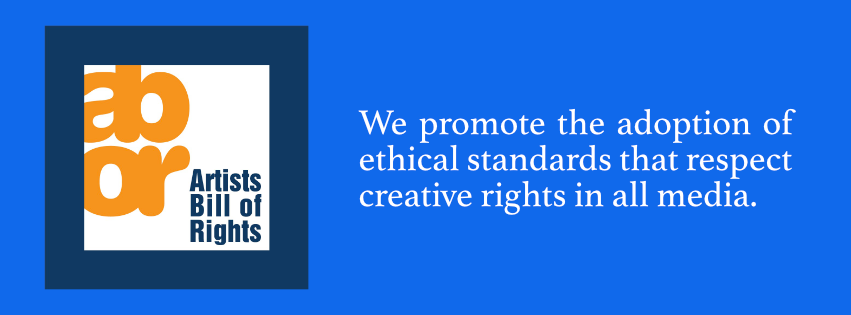Bill of Rights Condition 1
Moral rights must not be waived
Moral rights are a basic human right and are part of the law of copyright to ensure that you are, amongst other provisions, rightfully acknowledged as the creator of your works. You should not be asked to waive your moral rights in order to submit works to a competition or to an appeal for content by, for example, social networks such as Twitter, Facebook, etc. There are four moral rights.
The right to be credited
This is your right to be credited as the author of your work on every occasion it is published, exhibited, broadcasted, appears in a film or is otherwise displayed in any way. There is a list of exceptions, such as when a work is used for the reporting of news events, publishing in encyclopaedias, use in parliamentary or judicial proceedings, etc.
In the UK, and perhaps in other countries, it is required that you assert your moral right to be credited as the creator for each of your works. This should be done with a statement such as -
I, 'your full name', hereby assert my moral right to be identified as the creator of 'Title of Work', as may be required by any laws in any countries in the world.
The right to object to derogatory treatment of a work
This right gives you the legal right to object to treatment of your work such that you deem it to be prejudicial to your honour and reputation. It is often claimed by competition organisers that they need you to waive your moral rights so that if they crop a photograph for example, you cannot complain. It is accepted that competition organisers need the right to say, resize an image for reproduction purposes, but they should never crop your work to the extent that you feel the need to object to how they have treated it.
It is simply a matter of respecting your work. After all the organiser is gaining a free right to use it to promote the competition. If they were negotiating with you for rights to use it commercially, and it is required to be cropped to suit the intended commercial use, then you are free to set terms and conditions for such usage. A competition however, should be about celebrating the works submitted and presenting them as the creator intended.
The right not to have a work falsely attributed to you
This right belongs to everyone. For example, it could be used to defend against a case of an unscrupulous publisher using the name of a prestigious artist to add credibility to artworks appearing in the publishers' books, artworks that the named artist did not create. That artist has the right to a legal remedy in such cases.
The right to privacy in respect of certain photographs & films
This right applies to everyone. Although moral rights apply in all countries who are signatories to the Berne Convention, interpretation can vary greatly between them as in this specific case. For absolute safety, if you have works featuring recognisable people, then for complete protection you must ensure you have signed model release forms from each such person that permit you to use their likenesses without restriction.
Waiving of moral rights
Note that unlike copyright, your moral rights cannot be assigned to anyone else. They are yours and yours alone. You may, by a written and signed agreement, with another specific person or body, waive your moral rights for specific images. Such an agreement is called a waiver. So even if you have assigned copyright to another person or body, you can still enforce your moral rights, unless you have also signed a waiver with that person or body, in which case you have lost the right to enforce your moral rights against that person or body.
Competitions
Competitions which have a statement requiring you to waive your moral rights, either in order to enter the contest, or to be selected as a winner, are removing from you a basic human right. Such contests should never be entered.
NB! The above is not to be read as a statement of the law. It is merely an outline of the main legal provisions regarding moral rights. If you need legal advice regarding copyright and moral rights issues you should consult a lawyer specialising in intellectual property.
If you would like to know more about copyright and related rights please read our Guide to Rights and Licensing.
![]()

